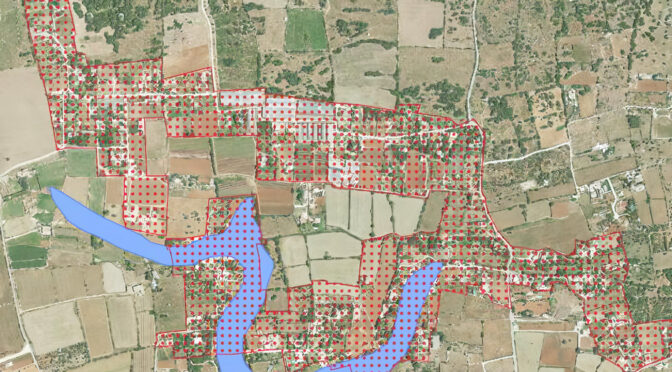Views: 1081
Allowing construction in flood or fire risk areas again, legalizing buildings on rural land without meeting the minimum parameters set by territorial planning, and contradicting higher regulations through a Decree Law based on “extraordinary and urgent necessity” represents a substantial change in the legal conditions of the Balearic Islands’ territory. This arbitrary move creates significant discrimination among citizens.
The Balearic Government’s Omnibus Decree Law, described as administrative simplification, has amended dozens of legal texts. According to GOB, this initiative includes several potential causes for unconstitutionality.
For these reasons, a study of legal considerations has been sent to the Central Government’s Presidency and various parliamentary groups in Madrid, requesting that the new text be challenged before the Constitutional Court.
This initiative was presented on the morning of July the 23rd in Palma at a joint press conference by the Interisland GOB commission, with representatives from Mallorca, Menorca, and Ibiza.
A Decree Law serving only particular interests
Justifying the re-authorization of construction in risky areas, such as flood or fire zones, lacks explanations that respond to general interest. The regulations to prevent new settlements in potentially tragic areas emerged after numerous incidents had resulted in tragedies. Ignoring these precautions now can only be explained by the desire to satisfy certain particular interests, never by rational urban planning.
Perhaps for these reasons, the Decree Law also modified the concept of what constitutes the “general interest.” Henceforth, project benefits no longer need to transcend mere individual interests, as previously required by existing legislation.
Comparative grievances and unfair competition
The provision allowing the legalization of buildings on rural land is also arbitrary, as it creates comparative grievances among citizens. Anyone wishing to build on rural land must adhere to minimum plot sizes, maximum heights, specific volumetric limits, and other urban planning parameters, besides hiring qualified experts and paying the necessary licenses. Now, thousands of buildings are set to be legalized without meeting the urban planning parameters required for those who comply with the law.
This is particularly severe for businesses. Legalizing businesses on rural land without requiring the same standards as those observed by similar lawful enterprises results in unfair competition. Legal businesses bear more burdens, preventing equal opportunities in subsequent economic activities. This was one of the main arguments leading to a court ruling annulling the declaration of general interest for the Biniancolla water park in Menorca when a similar company argued that the legal burdens they assumed were much higher, constituting unfair competition.
For these reasons, GOB considers the Decree Law potentially the largest speculative operation in the history of democracy in the Balearic Islands.
Environmental Regression in Project Evaluation
The Decree Law also amends the Environmental Assessment Law, significantly increasing the threshold for mandatory environmental assessment. For example, water reservoirs over 500,000 m³ previously required assessment; now the threshold is 2,000,000 m³—four times higher, without any explanation. Similarly, changes now avoid the need for environmental impact declarations for beach regeneration projects unless they exceed 500,000 m³.
Amendments to the Menorca Biosphere Reserve Law
The Decree Law also reduces significant aspects of the Menorca Biosphere Reserve Law, again without any explanation. Examples of eliminated elements include:
- The binding nature of the island’s decarbonization objectives.
- The binding nature of the Urban Agenda objectives.
- The mandate to organize tourism activities in line with the island’s carrying capacity thresholds.
- The goal to increase renewable energy to reorient Maó’s thermal power plant to a support and emergency facility.
- The implementation of low-emission zones.
- The maintenance and improvement of collective civic awareness, associations, and volunteering.
- The Biosphere Reserve Biodiversity Committee.
- The functioning regime of the Biosphere Reserve Consultative Authority.
It is essential to remember that UNESCO-declared Biosphere Reserves are protected areas under international instruments.
A Decree Law that does not justify urgency
The Decree Law formula should only be used in situations of extraordinary and urgent need. However, nothing here seems to fit such a premise. It is not urgent to allow construction in protected risk areas or to legalize rural buildings serving strict particular interests. Creating unfair competition in rural economic activities is not an extraordinary necessity.
Despite plans to process the Decree Law as ordinary law, three Island Councils have already agreed to legalize buildings, effectively enacting the urgency route unjustifiably.
Central Government Presidency or Parliamentary Groups
The pathway to presenting a potential unconstitutionality appeal of a regulation approved by a regional parliament lies with the Central Government Presidency or the initiative of at least 50 parliamentarians petitioning the Constitutional Court.
GOB has prepared a text with abundant legal arguments and directed the petition to both potential routes. We trust that the chaos caused by this irresponsible Decree Law can ultimately be rectified by other authorities.
This text is an adaptation from an automated translation of the original publication in Catalan on the GOB Menorca website.


One thought on “Petition for Unconstitutionality of the Omnibus Decree Law”
Comments are closed.